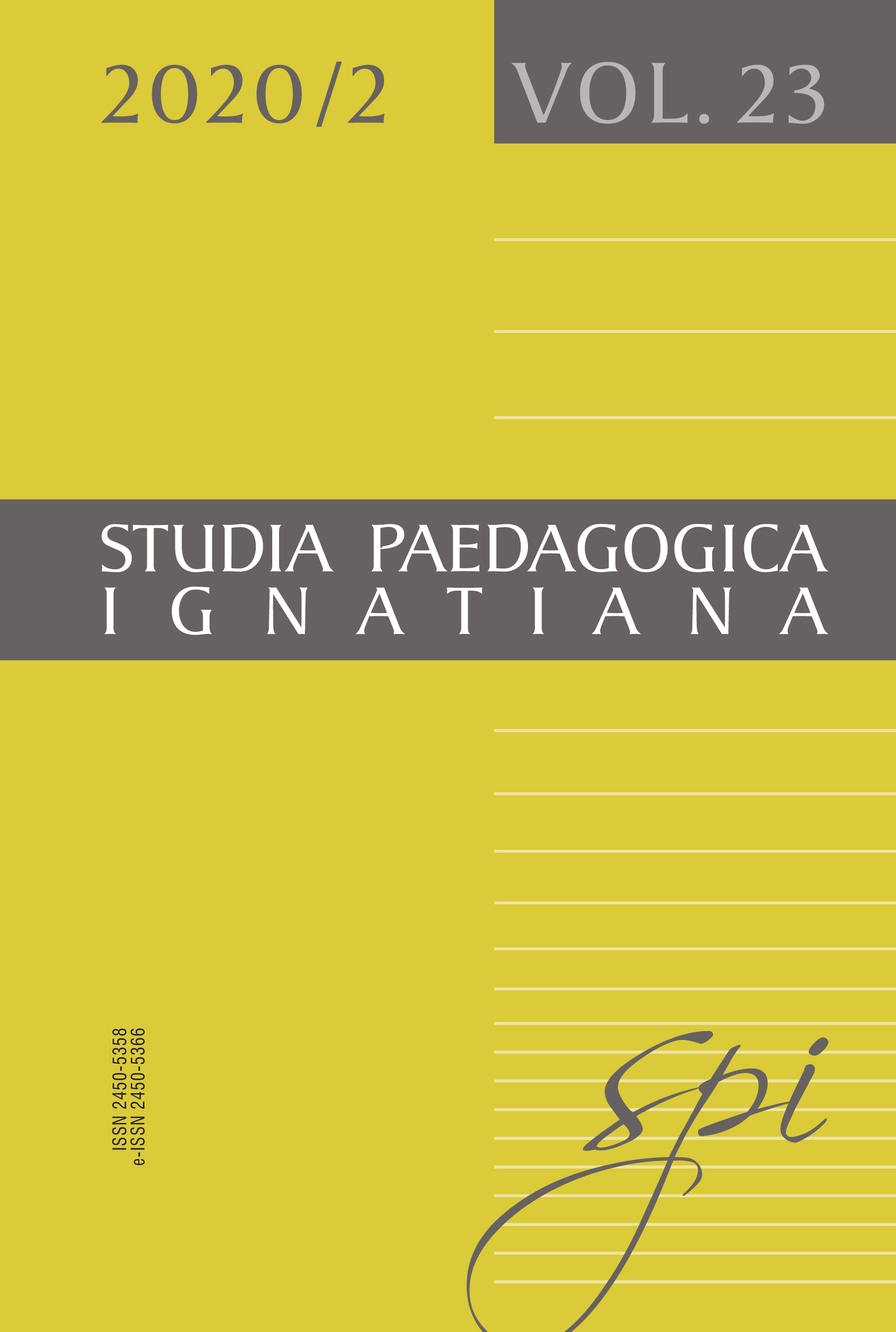Działalność Stowarzyszenia Grona Nauczycielskiego Uniwersytetu Stefana Batorego w Wilnie (1923-1939). Zarys problemu
DOI:
https://doi.org/10.12775/SPI.2020.2.003Słowa kluczowe
Stowarzyszenie Grona Nauczycielskiego USB, Uniwersytet Stefana Batorego w Wilnie, cel i program Stowarzyszenia, członkowie StowarzyszeniaAbstrakt
Podstawowym zamysłem autorki jest nakreślenie krótkiej historii powstania, struktury i celów działania oraz sposobów ich realizacji przez członków Stowarzyszenia Grona Nauczycielskiego Uniwersytetu Stefana Batorego w Wilnie (USB). Ważną intencją artykułu jest także ukazanie źródeł do dziejów tego Stowarzyszenia, które mogą być wykorzystane do dalszych badań. Stowarzyszenie to działało w latach 1923–1939 i skupiało nauczycieli akademickich Uniwersytetu Wileńskiego. Jego głównym celem było wspieranie rozwoju nauki w ogólności, a przede wszystkim pomoc w przygotowaniu nowej, dobrze wykształconej kadry nie tylko dla szkół wyższych, ale i innych ważnych instytucji w odrodzonym państwie polskim. Nie mniej ważnym celem w programie działania tego Stowarzyszenia była integracja środowiska uniwersyteckiego wokół ważnych zagadnień i spraw naukowych, a także bytowych nauczycieli akademickich oraz ich rodzin. Członkami Stowarzyszenia byli nauczyciele akademiccy wszystkich wydziałów Uniwersytetu Stefana Batorego. Informacje prezentowane w niniejszym szkicu są wynikiem analizy przede wszystkim materiałów archiwalnych znajdujących się w spuściźnie jednego z członków Stowarzyszenia, mianowicie Tadeusza Czeżowskiego, który, przybywszy z Wilna do Torunia, był jednym z twórców uniwersytetu w Toruniu. Materiały te znajdują się w Archiwum Uniwersytetu Mikołaja Kopernika.
Bibliografia
Archiwum Uniwersytetu Mikołaja Kopernika (w skrócie: A UMK): A UMK, sygn. 309/80/II, j. 20-43. A UMK, Spuścizna Tadeusza Czeżowskiego. Dokumenty Stowarzyszenia Grona Nauczycielskiego, sygn. 309/80/II, j. 20–43.
Rocznik Uniwersytetu Stefana Batorego w Wilnie 1938–1939, Wilno: Nakładem Uniwersytetu Stefana Batorego.
Ustawa z dnia 15 marca 1933 r. o szkołach akademickich. Dziennik Ustaw RP, 29, poz. 247, 594–603.
Czeżowski T. (1988). Wspomnienia, [w:] I. Stasiewicz-Jasiukowa, M. Miśkowiec (red.), Uczeni polscy o sobie, t. 1, Warszawa: Młodzieżowa Agencja Wydawnicza, s. 126–131.
Górski K. (1995). Pamiętniki, Toruń: Wydawnictwo Comer.
Grochowina S. (2012). Kolankowski Ludwik 1882–1956. Zapiski pamiętnikarskie, Toruń: Wydawnictwo Naukowe Uniwersytetu Mikołaja Kopernika.
Lutosławski W. (1933). Jeden łatwy żywot, Warszawa: Wydawnictwo Monolit.
Meysztowicz W. (2012). Gawędy o czasach i ludziach, Łomianki: Wydawnictwo LTW.
Miłosz C. (1990). Do Tomasza Venclovy, [w:] tegoż, Zaczynając od moich ulic, Wrocław: Wydawnictwo Dolnośląskie.
Ruszczyc F. (1996). Dzienniki, cz. 2: W Wilnie 1919–1932, Wybór, układ, opracowanie, wstęp i posłowie E. Ruszczyc, Warszawa: Wydawnictwo „Secesja”.
Sławińska I. (2004). Szlakami moich wód…, Lublin: Wydawnictwo Norbertinum.
Stomma S. (1998). Trudne lekcje historii, Kraków: Wydawnictwo Znak.
Tatarkiewiczowie T. i W. (2011). Wspomnienia, Poznań: Wydawnictwo Zysk i S-ka.
Zgorzelski C. (2006). Przywołane z pamięci, wyd. 2, Lublin: Wydawnictwo Norbertinum.
Żongołłowicz B. (2004). Dzienniki 1930–1936, oprac. D. Zamojska, Warszawa: Przegląd Wschodni Retro-Art.
Czeżowski T. (1973). Filozofia polska w dwudziestoleciu międzywojennym. (Zarys rozwoju), „Studia Filozoficzne”, nr 2, s. 61–69.
Dalecka T. (2003). Dzieje polonistyki wileńskiej 1919–1939, Kraków: Wydawnictwo Towarzystwa Naukowego „Societas Vistulana”.
Gawrońska-Garstka M. (2016). Uniwersytet Stefana Batorego w Wilnie. Uczelnia ziem północno-wschodnich Drugiej Rzeczypospolitej (1919–1939) w świetle źródeł, Poznań: Wydawnictwo Rys.
Gołubiew A. (1971). Wychowawca, [w:] tegoż, Unoszeni historią, Kraków: Wydawnictwo Znak.
Jadacki J.J. (1994). Sławni Wilnianie filozofowie, Wilno: Wydawnictwo Polskie w Wilnie.
Krasnodębski J. (2019). Z Wilna nad Wilią do „Wilna nad Wisłą”. Ekspatriacja i osiedlenie mieszkańców Wileńszczyzny w Toruniu (1944–1948), Toruń: Wydawnictwo Naukowe Uniwersytetu Mikołaja Kopernika.
Opacki Z. (1998). Reaktywacja czy powstanie? Dyskusje wokół utworzenia Uniwersytetu Stefana Batorego w Wilnie w latach 1918–1919, „Kwartalnik Historyczny”, nr 3, s. 49–64.
Piechnik L., Puchowski K. (red.) (1996). Z dziejów Almae Matris Vilnensis. Księga pamiątkowa ku czci 400-lecia założenia i 75-lecia wskrzeszenia Uniwersytetu Wileńskiego, Kraków: Wydawnictwo WAM.
Pigoń S. (1929). Koła naukowe studentów Uniwersytetu Stefana Batorego w latach 1919–1929, [w:] Księga Pamiątkowa ku uczczeniu CCCL rocznicy założenia i X wskrzeszenia Uniwersytetu Wileńskiego, t. 2: Dziesięciolecie 1919–29, Wilno: Nakładem Uniwersytetu Stefana Batorego, s. 595–614.
Szulakiewicz W. (2003). Ludwik Chmaj – zarys biografii i twórczości pedagogicznej, „Rozprawy z Dziejów Oświaty”, t. 42, s. 161–182.
Szulakiewicz W. (2010). Za przykładem mistrza. Tadeusza Czeżowskiego (1889–1981) służba uniwersytetowi i nauce, „Rozprawy z Dziejów Oświaty”, t. 47, s. 109–127.
Szulakiewicz W. (2017). „Alma Mater Vilnensis” (1922–1935) – źródło do dziejów życia uniwersyteckiego, „Acta Universitatis Nicolai Copernici – Pedagogika”, t. 34, nr 2, s. 9–32.
Szulakiewicz W. (2019). Pedagogika na Uniwersytecie Stefana Batorego, Toruń: Wydawnictwo Naukowe Uniwersytetu Mikołaja Kopernika.
Tomaszewski P. (2018). Uniwersytet Stefana Batorego w Wilnie w latach 1919–1939. Studium z dziejów organizacji i postaw ideowych studentów, Toruń: Wydawnictwo Naukowe Uniwersytetu Mikołaja Kopernika.
Wrzosek A. (1929). Wskrzeszenie Uniwersytetu Wileńskiego w r. 1919, [w:] Księga Pamiątkowa ku uczczeniu CCCL rocznicy założenia i X wskrzeszenia Uniwersytetu Wileńskiego, t. 2: Dziesięciolecie 1919–29, Wilno: Nakładem Uniwersytetu Stefana Batorego, s. 1–32.
Zdziechowski M. (1927). W walce o duszę młodzieży akademickiej z czasów rektorstwa, Wilno: Księgarnia Stowarzyszenia Nauczycielstwa Polskiego w Wilnie.
Pobrania
Opublikowane
Jak cytować
Numer
Dział
Licencja
Autor zgłaszając swój artykuł oświadcza, że:
jest Autorem artykułu (zwanego dalej Utworem) i:
- przysługują mu wyłączne i nieograniczone prawa autorskie do Utworu,
- jest uprawniony/a do rozporządzania prawami autorskimi do Utworu.
Udziela Uniwersytetowi Ignatianum w Krakowie nieodpłatnej, niewyłącznej, nieograniczonej terytorialnie licencji do korzystania z Utworu na następujących polach eksploatacji:
- utrwalania utworu w formie papierowej, a także na nośniku cyfrowym lub magnetycznym;
- zwielokrotnienia utworu dowolną techniką, bez ograniczenia ilości wydań i liczby egzemplarzy;
- rozpowszechniania utworu i jego zwielokrotnionych egzemplarzy na jakimkolwiek nośniku, w tym wprowadzenia do obrotu, sprzedaży, użyczenia, najmu;
- wprowadzenia utworu do pamięci komputera;
- rozpowszechniania utworu w sieciach informatycznych, w tym w sieci Internet;
- publicznego wykonania, wystawienia, wyświetlenia, odtworzenia oraz nadawania i reemitowania, a także publicznego udostępniania utworu w taki sposób, aby każdy mógł mieć do niego dostęp w miejscu i czasie przez siebie wybranym;
- w zakresie praw zależnych do Utworu, obejmujących w szczególności prawo do dokonania koniecznych zmian w Utworze, wynikających z opracowania redakcyjnego i metodycznego, a także do dokonania tłumaczenia Utworu na języki obce.
Udzielenie licencji następuje z chwilą przekazania Utworu na rzecz Uniwersytetowi Ignatianum w Krakowie. Uniwersytet Ignatianum w Krakowie jest uprawniony do udzielania dalszych sublicencji do Utworu, w zakresie udzielonego prawa. Licencja jest ograniczona czasowo i zostaje udzielona na okres 15 lat, licząc od daty jej udzielenia.
Polityka prywatności
Statystyki
Liczba wyświetleń i pobrań: 1018
Liczba cytowań: 0



